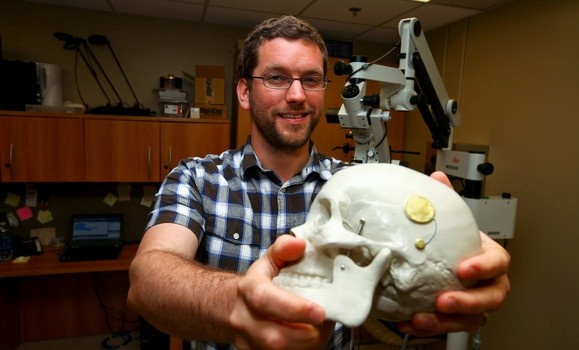Conspicuous hearing aids may soon be a thing of the past thanks to a new device developed by three Dalhousie faculty members.
For the past several years, Manohar Bance, professor and acting head of the Faculty of Medicine’s otolaryngology division, and two assistant professors in the School of Biomedical Engineering, Jeremy Brown and Rob Adamson, have been developing a new hearing aid implant that will be invisible to the naked eye.
Last week, it was announced that Dal has signed an exclusive worldwide licensing agreement for the hearing aid technology with U.S. medical device company Ototronix.
“I’m excited and apprehensive,” says Dr. Bance. He calls the licensing agreement “the starting point. We have a lot of work ahead of us. It takes about two years just to get basic trials done.”
Dr. Bance is a surgeon and says he is mostly involved in the “clinical side” of things. “My role in this has been mostly surgical and clinical: figuring out how big the device will be, how we can implant it, what are the challenges of implantation, what patient population we’re targeting, how patients can benefit.”
“Feels like part of your body”
The device that Drs. Bance, Brown and Adamson have developed is designed for patients suffering from ear damage and unilateral (one-sided) hearing loss. It differs from traditional cochlear implants, which are implanted in the middle ear, by being implanted directly on the skull.
“[The] skin heals over it, so it's basically invisible once it's been implanted” says Dr. Adamson. “Instead of sticking something in your ear that you're constantly wearing, an implanted hearing aid is something that feels like part of your body…from a patient's point of view, this is a great thing because it just becomes a part of them and they don't have to think about it anymore."
MIchael Spearman, CEO of Ototronix, says that inconspicuousness will play a big part in the device’s appeal.
“Only a fourth of the people who need hearing aids wear them,” he says. “A lot of the products currently on the market use a titanium abutment...basically a screw that goes into the head. Somebody takes it off, they look like Frankenstein; there's a little peg sticking out. With this, it's totally invisible when the person isn't wearing their hearing aid device. It's very discrete, gives better efficacy, and better cosmetics."
The project also miniaturizes the power source for the hearing aid. “The things that have traditionally powered hearing aids are much bigger than the hearing aids themselves,” says Dr. Adamson. “The goal here is to make something innocuous and invisible and power systems have to be included as well.”
Success through partnership
Bringing their device to the commercial market required a partnership with a company like Ototronix. Luckily, Mr. Spearman was in attendance at a conference at which Dr. Brown gave the keynote address.
“It was interesting when Jeremy was giving his talk,” he says. “[We] said, ‘This is different.’ We knew these guys were on to something and had unique technology and, to us, if we’re going to be bringing new technology to the market, it’s got to be different. It can’t be the same old stuff.”
“These [Ototronix] guys are absolute experts in the stuff that’s hard for academics – the marketing and distribution of devices,” says Dr. Adamson. “They’ve proven they can bring implanted hearing aids to the market successfully and they sit at a place in the system where they’re in constant contact with clinicians all over the world. They’ve really helped us so far in the device trial tests and I’m sure they’ll continue to help us over the next several years.”
Stephen Hartlen, Dalhousie’s assistant vice-president of industry relations, says the license is just the beginning. “We have great confidence in Ototronix and know they’ll be very successful in marketing this world-class innovation created right here at Dalhousie and Capital Health,” he says
Those sentiments are echoed by Raymond LeBlanc, vice-president of learning, research and innovation at Capital Health: “We look forward to many repetitions (of this), much more DNA that shows what can happen as a result of the interdisciplinary partnerships between the Faculties of Medicine and Engineering and Dalhousie’s Industry Liaison and Innovation and Biomedical Engineering departments.”
“It’s really quite a big project when you think of all the parts that had to come together,” says Dr. Adamson. “I don’t think there’s a better place in the world to be doing this than Dalhousie.”

